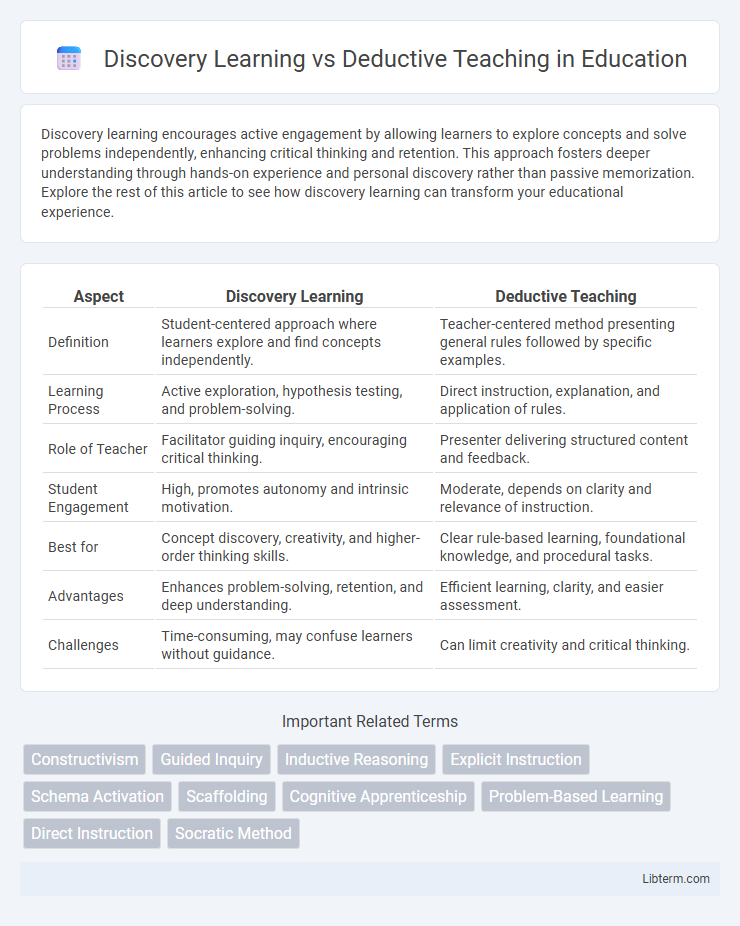Discovery learning encourages active engagement by allowing learners to explore concepts and solve problems independently, enhancing critical thinking and retention. This approach fosters deeper understanding through hands-on experience and personal discovery rather than passive memorization. Explore the rest of this article to see how discovery learning can transform your educational experience.
Table of Comparison
| Aspect | Discovery Learning | Deductive Teaching |
|---|---|---|
| Definition | Student-centered approach where learners explore and find concepts independently. | Teacher-centered method presenting general rules followed by specific examples. |
| Learning Process | Active exploration, hypothesis testing, and problem-solving. | Direct instruction, explanation, and application of rules. |
| Role of Teacher | Facilitator guiding inquiry, encouraging critical thinking. | Presenter delivering structured content and feedback. |
| Student Engagement | High, promotes autonomy and intrinsic motivation. | Moderate, depends on clarity and relevance of instruction. |
| Best for | Concept discovery, creativity, and higher-order thinking skills. | Clear rule-based learning, foundational knowledge, and procedural tasks. |
| Advantages | Enhances problem-solving, retention, and deep understanding. | Efficient learning, clarity, and easier assessment. |
| Challenges | Time-consuming, may confuse learners without guidance. | Can limit creativity and critical thinking. |
Introduction to Discovery Learning and Deductive Teaching
Discovery learning promotes active student engagement by encouraging exploration and problem-solving to acquire knowledge, fostering deeper understanding and retention. Deductive teaching follows a structured approach where concepts are presented first, followed by examples and practice, emphasizing clarity and efficient knowledge transfer. Both methods have distinct roles in education, with discovery learning enhancing critical thinking skills and deductive teaching providing direct instruction for foundational knowledge.
Defining Discovery Learning: An Experiential Approach
Discovery learning is an experiential approach where learners actively engage in exploring concepts and solving problems without explicit instruction, promoting deeper understanding through firsthand experience. This method encourages critical thinking and intrinsic motivation by allowing students to connect new information with prior knowledge organically. Its emphasis on learner autonomy contrasts with deductive teaching, which relies on direct presentation of rules and systematic explanations.
Understanding Deductive Teaching: A Structured Method
Deductive teaching employs a structured method that begins with presenting general rules or principles before moving to specific examples and applications, facilitating clear understanding and consistent knowledge acquisition. This approach emphasizes logical progression and explicit instruction, enabling learners to grasp foundational concepts efficiently and apply them systematically. Studies show that deductive teaching improves retention and performance in subjects requiring rule-based comprehension, such as mathematics and grammar.
Core Principles of Discovery Learning
Discovery Learning centers on active student engagement, encouraging learners to explore, experiment, and construct knowledge independently, which fosters deeper understanding and critical thinking skills. Core principles emphasize learner autonomy, inquiry-based problem solving, and the assimilation of new information through personal experience rather than direct instruction. This approach contrasts with Deductive Teaching, which relies on explicit instruction and step-by-step presentation of rules or concepts before application.
Fundamental Concepts in Deductive Teaching
Deductive teaching emphasizes presenting fundamental concepts explicitly before moving to specific applications, ensuring students grasp core principles clearly and systematically. This method relies on structured lessons where foundational knowledge such as definitions, rules, and theories is introduced upfront, fostering efficient comprehension and retention. Contrasting with discovery learning, deductive teaching minimizes ambiguity by guiding learners directly through essential material to build a solid conceptual framework.
Comparing Learning Outcomes and Student Engagement
Discovery learning promotes higher student engagement by encouraging active exploration, which enhances critical thinking and retention compared to the more passive reception found in deductive teaching. Studies reveal that students in discovery learning environments often achieve deeper conceptual understanding, while deductive teaching yields quicker mastery of factual knowledge and procedural skills. Balancing both methods leverages discovery learning's motivational benefits with deductive teaching's efficiency, optimizing overall learning outcomes.
Advantages and Limitations of Discovery Learning
Discovery learning promotes deeper understanding and critical thinking by encouraging students to explore concepts independently, leading to improved problem-solving skills and long-term knowledge retention. However, it may result in cognitive overload for learners lacking prior knowledge, and its open-ended nature can cause confusion or frustration without adequate guidance. Effective implementation requires balancing student autonomy with structured support to maximize engagement and learning outcomes.
Pros and Cons of Deductive Teaching
Deductive teaching provides clear, structured instruction that helps students quickly grasp fundamental concepts through direct explanation and rule application, enhancing efficiency in learning foundational knowledge. However, it may limit critical thinking and creativity by encouraging rote memorization and passive reception rather than exploration and independent problem-solving. This method works well for beginners needing concrete guidance but can reduce student engagement and deeper conceptual understanding compared to discovery learning.
Practical Applications in Modern Classrooms
Discovery learning emphasizes student-driven exploration and problem-solving, fostering critical thinking and deeper conceptual understanding through hands-on activities and experiments. Deductive teaching follows a structured approach where rules and concepts are explicitly presented before students apply them, ensuring clarity and efficiency in mastering foundational knowledge. Modern classrooms often integrate both methods, using discovery learning to promote creativity and engagement, while deductive teaching reinforces explicit instruction for complex or abstract subjects.
Selecting the Optimal Approach: Factors to Consider
Selecting the optimal approach between discovery learning and deductive teaching depends on factors such as learner age, subject complexity, and cognitive development. Younger students and subjects requiring conceptual understanding benefit from discovery learning's hands-on exploration, while deductive teaching suits topics needing structured, rule-based instruction. The goal of maximizing engagement and retention must guide the choice, balancing learner autonomy with clear guidance for effective knowledge acquisition.
Discovery Learning Infographic

 libterm.com
libterm.com